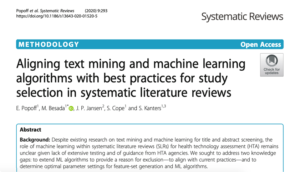Broadstreet at ISPOR 2023
ISPOR is back in person this year, taking place in Boston between May 7th to 10th. Members of the Broadstreet team are pleased to be presenting a number of posters and talks on a variety of topics this year ranging from epidemiological model methodology to the association between patient versus caregiver reported utility values.

Broadstreet authors will be giving two podium presentation this year on the following topics:
- The Association between Patient- and Caregiver-Reported Utility Values in Duchenne Muscular Dystrophy (DMD) Shelagh M. Szabo,1 Ivana F. Audhya,2 Andrea Bever,1 Fiona O’Sullivan,1 Daniel C. Malone,3 David Feeny,4 Peter Neumann,5 Susan T. Iannaccone,6 Pramoda Jayasinghe,1 Katherine L. Gooch2 1Broadstreet HEOR, Vancouver; 2Sarepta Therapeutics, Inc., USA; 3The University of Utah, USA; 4McMaster University, Hamilton; 5Tufts Medical Center, USA; 6The University of Texas Southwestern, USA
In this presentation we will discuss our study comparing patient- and caregiver-derived visual analogue scale and utility values for DMD health states. In studies of health-related quality of life and utility, in DMD and other conditions, caregivers frequently report on behalf of patients and in other therapeutic areas, research has identified that caregivers typically underreport utility compared with patients. We examined this relationship in DMD and found that patient and caregiver utility values demonstrate strong correlations and good concordance, particularly if patients are in ambulatory health states and when the instrument used is the Health Utilities Index.
Event time: Tuesday, May 9, 2023, 10:15 AM – 11:15 AM
- Indirect treatment comparisons of time to event outcomes with mis matched ‘time zero’: methodology and application in resectable non small cell lung cancer Sarah Goring,1 Basia Rogula,1 Stefano Lucherini,2 Lien Vo,3 Greta Lozano-Ortega,1 Mariam Besada,1 Mohammad A Chaudhary,3 Nebibe Varol,2 Peter Lam,3 Nicolas Girard,4 Jonathan Spicer5 1Broadstreet HEOR, Vancouver; 2Bristol Myers Squibb, UK; 3Bristol Myers Squibb, USA; 4Institut Curie & Institut Mutualiste Montsouris, France; 5McGill University Health Centre, Montreal
This presentation focuses on a study motivated by the unavailability of head-to-head comparisons between recently approved immune checkpoint inhibitors for resectable non small cell lung cancer, neoadjuvant nivolumab plus chemotherapy and adjuvant atezolizumab. Differences in “time-zero” precluded a traditional indirect treatment comparison of event free survival (EFS). The study presents a framework for time-zero adjusted indirect treatment comparisons which addresses differences in relative treatment effects over time, and two types of selection bias.
Event time: Monday, May 8, 2023 2:15 AM – 2:30 PM We will also be presenting several posters on Broadstreet supported research:
- Accurately counting cancer patients: An epidemiologic model to estimate the prevalence of epithelial ovarian cancer (EOC) while accounting for cure Talshyn Bolatova,1 Basia Rogula,1 Shelagh M. Szabo,1 Karissa M. Johnston1 ¹Broadstreet HEOR, Vancouver
The study sought to develop an epidemiological model for epithelial ovarian cancer (EOC) using Surveillance Epidemiology and End Results (SEER) data, that factors in incidence, survival, and cure likelihood and timing, to calculate an overall prevalence estimate of EOC with and without cured patients included. The methods described represent a robust prevalence estimation technique that uses survival curves to represent a range of survival trajectories, as opposed to the standard incidence x duration calculation for prevalence.
Event time: Tuesday, May 9, 2023 9:45 AM – 1:15 PM
- Reviewing Elements to inForm RE-running SearcHes: REFRESHing systematic literature reviews Mariam Besada1, Alison Deighton,1 Evan Popoff1, Sally D Miller,1 Michael Friesen1, Alexis T. Mickle,1 Greta Lozano-Ortega1 ¹Broadstreet HEOR, Vancouver
This project compared two approaches for refreshing database searches in OVID using a case study: a date-restricted approach with optional matching and an unrestricted approach with mandatory matching. The latter approach is recommended, as it is more sensitive than a date-restricted approach. If a date-restricted approach is preferred (e.g. if there are differences in the study record formatting across searches that preclude accurate matching), multiple date fields should be included to ensure comprehensive results.
Event time: Tuesday, May 9, 2023 9:45 AM – 1:15 PM
- Coverage of aspects of occupational functioning by health state utility instruments Jessica Dunne,1 Evelyn Griffin,1 Kathy Osenenko,1 Shelagh M Szabo1 ¹Broadstreet HEOR, Vancouver
This work aimed to evaluate the inclusion of occupational functioning aspects in adult health state utility instruments (HSUIs) and found that the Quality of Well Being scale, has definite and specific coverage for self-care, productivity, and leisure.
Event time: Tuesday, May 9, 2023 9:45 AM – 1:15 PM
- Making a case for case reports: A scoping review of the use of and challenges with case report data in quantitative synthesis Antoinette Cheung,1 Fiona O’Sullivan,1 Sarah Walker,1 Lauren C Powell,1 Shelagh M Szabo1 1Broadstreet HEOR, Vancouver
This scoping review characterized contemporary methodologies used for quantitatively synthesizing case report data and highlighted common approaches, potential value, and limitations of quantitative evidence synthesis of case report data.
Event time: Tuesday, May 9, 2023 3:15 PM – 6:45 PM Additionally, we are pleased to be presenting on a number of collaborations with clients:
- The Economic Burden of Preterm Labor (PTL): A systematic Literature Review Tina Li,1 Hannah Rochon,1 Megan Manuel,1 Shelagh M Szabo,1 Vanessa Perez Patel2 1Broadstreet HEOR, Vancouver; 2Organon, USA
This study, conducted in cooperation with our colleagues from Organon aimed to synthesize contemporary real-world estimates of economic burden among mothers diagnosed with PTL or infants born following a PTL diagnosis (whether born at term or preterm). We found that few studies have examined the economic burden of PTL and available estimates are variable.
Event time: Monday, May 8, 2023 3:15 PM – 6:45 PM
Francesco Fusco,1 Martin Barbeau,2 Talshyn Bolatova,1 Basia Rogula,1 Karissa Johnston,1 Greta Lozano-Ortega1 1Broadstreet HEOR, Vancouver; 2Bausch Health, Canada Inc., Laval
Conducted with our colleagues from Bausch, this work estimated the cost-effectiveness of incorporating halobetasol/tazarotene (HP/TAZ) into treatment sequences of topical therapies among patients with moderate-to-severe plaque psoriasis in Québec, compared to the current standard of care (SC) treatment sequences without HP/TAZ. We found that incorporating HP/TAZ into SC treatment sequences yielded better treatment outcomes, leading to the delay of more costly therapies, which resulted in long-term cost savings.
Event time: Tuesday, May 9, 2023 3:15 PM – 6:45 PM
- Estimating Utility Values Using the Duchenne Muscular Dystrophy-Quality of Life Measure (DMD-QoL): A New Preference-Based Measure for DMD Andrea Bever,1 Ivana F. Audhya,2 Shelagh M. Szabo,1 Pramoda Jayasinghe,1 David Feeny,3 Peter Neumann,4 Daniel C. Malone,5 Susan T. Iannaccone,6 Katherine L. Gooch1 1Broadstreet HEOR, Vancouver; 2Sarepta Therapeutics, Inc., USA; 3McMaster University, Hamilton; 4Tufts Medical Center, USA; 5The University of Utah, USA; 6The University of Texas Southwestern, USA
The study sought to understand how DMD-QoL utilities compare to those measured using a generic preference-based measure, the Health Utilities Index (HUI). HUI2 utility values declined with increasing DMD functional severity. Findings included that the HUI2 appears more sensitive to changes in functional status, but values estimated using the DMD-QoL may reflect a broader conceptualization of HRQoL
Event time: Wednesday, May 10, 2023 8:30 AM – 11:30 AM If you have questions about any of these projects, please get in touch at info@broadstreetheor.com


